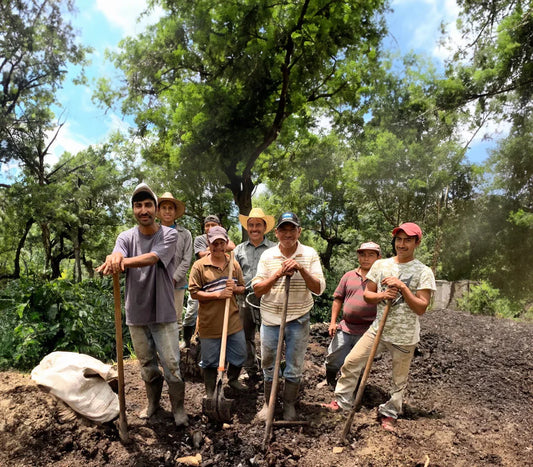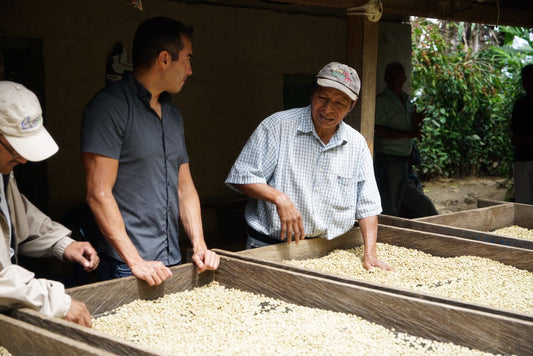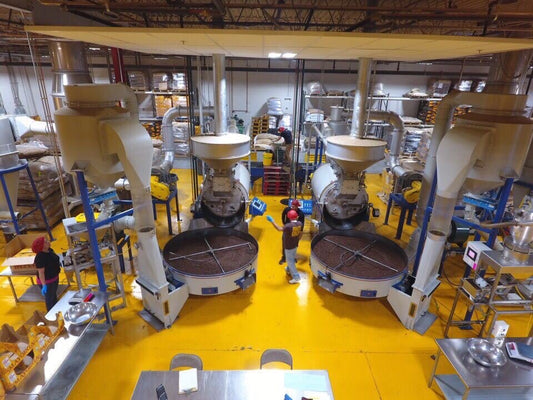
El impacto del aumento de los precios del café en los pequeños productores de América Latina: perspectivas de Mayorga Coffee
El reciente aumento de los precios mundiales del café a través del Mercado C de Materias Primas ha generado gran atención, generando optimismo y preocupación. (Sí, preocupación). Si bien los consumidores pueden creer que esto representa una ventaja para los productores, la realidad es más compleja. Para los pequeños agricultores de zonas remotas de América Latina, el aumento de los precios podría ofrecer un alivio temporal, pero los desafíos sistémicos que enfrentan exigen soluciones a largo plazo.
DINÁMICA DEL MERCADO Y REALIDADES DE LOS PEQUEÑOS PRODUCTORES
Si bien el aumento de los precios de las materias primas podría sugerir un aumento de los ingresos para todos los agricultores, la realidad es más matizada. Los pequeños productores a menudo carecen de acceso directo a los mercados internacionales, y dependen, en cambio, de intermediarios que dominan el arte de crear narrativas para reducir sus ingresos. Algunos ejemplos que he presenciado de primera mano:
- Afirmando que el café tenía un porcentaje mucho mayor de defectos cuando se procesaba en el beneficio
- Ofrecen financiamiento previo a la cosecha de café, lo que le otorga un valor de producto básico (en lugar de especialidad), que luego prestan al 75 % LTV para cobrar un interés MENSUAL del 3 al 5 %
- Afirmar que el café tiene una puntuación más baja una vez envasado y sellado en un contenedor de envío, lo que obliga a los productores a negociar un precio más bajo.
- Cobro de “comisiones de venta” por representar a la cooperativa/productor en el mercado
- Establecer contratos prepagos de varios años, dejando a los productores fuera de las ventajas del mercado cuando prometen sus tierras como garantía.
- La lista sigue y sigue y sigue.
CAMBIO CLIMÁTICO Y RETOS DE PRODUCCIÓN
El cambio climático sigue representando amenazas significativas para la producción de café en América Latina. Los patrones climáticos impredecibles han alterado el calendario de las cosechas, la migración ha limitado considerablemente la disponibilidad de personal de apoyo, las tasas de interés son punitivas, el acceso al financiamiento es muy limitado y, en algunas zonas, la hoja de coca es un cultivo predilecto debido a sus altos precios de mercado. Estos desafíos no solo afectan la cantidad de café producido, sino también su valor de mercado, lo que complica aún más la estabilidad financiera de los pequeños agricultores.
EL CAFÉ ESTÁ DESPERTANDO A LAS PRÁCTICAS ORGÁNICAS REGENERATIVAS
Si bien, en mi opinión, se trata principalmente de un enfoque oportunista y performativo, la industria del café finalmente está hablando de prácticas regenerativas (como permacultura, diversificación, circularidad, etc.). Afortunadamente, los productores de Mayorga llevan años implementando prácticas orgánicas regenerativas, lo que ayuda a compensar algunas de estas preocupaciones. Mayorga comprende desde hace años que un suelo y unas comunidades saludables son la base de un café excelente. Hemos apoyado a nuestros caficultores para diversificar sus cultivos y adoptar prácticas agrícolas sostenibles. Algunos crían gallinas que les proporcionan ingresos e insumos para fertilizantes, otros utilizan subproductos del compost para compostaje, y otros siembran chía, frijoles y otros productos que fijan el nitrógeno y generan ingresos adicionales. La diversificación puede generar fuentes de ingresos alternativas, reduciendo la dependencia del café y mejorando la resiliencia frente a la volatilidad del mercado y las presiones ambientales. Las prácticas regenerativas, como la agroforestería, la gestión adecuada del agua y la agricultura orgánica, mejoran la salud del suelo y aumentan la resiliencia al cambio climático, lo que se traduce en mejores rendimientos y calidad a largo plazo.
EL PAPEL DE LAS RELACIONES DIRECTAS Y LOS PRECIOS SOSTENIBLES
Establecer relaciones directas ha sido crucial para Mayorga, ya que garantiza que nuestros productores se beneficien de ellas, independientemente del mercado. Algunos años su margen es mejor que otros, pero siempre mantenemos una comunicación directa para asegurar que operen a niveles sostenibles. Nunca hemos afirmado ser la marca de café que paga el precio más alto a los productores. Si bien los microtostadores suelen centrarse en lotes más pequeños con precios más altos, nuestro enfoque es construir alianzas a largo plazo y escalables que ofrezcan primas consistentes para el café orgánico de especialidad.
CONCLUSIÓN
Si bien el aumento de los precios del café puede ofrecer un alivio temporal, está lejos de ser una solución a los desafíos sistémicos que enfrentan los pequeños agricultores en zonas remotas de América Latina. El verdadero progreso requiere más que pagos más altos: exige un compromiso profundo para comprender sus realidades, desarrollar prácticas sostenibles y fomentar alianzas equitativas. Los productores adinerados y bien conectados siempre prosperarán en cualquier mercado, pero si queremos generar un cambio significativo, debemos centrarnos en apoyar a los agricultores más vulnerables. La verdadera transformación se logra mediante la participación directa, la responsabilidad compartida y la acción a largo plazo que empodere a los productores para construir un futuro sostenible. Este ha sido el compromiso de Mayorga durante los últimos 27 años y lo seguirá siendo mientras tengamos consumidores conscientes que valoren la coexistencia de calidad, valor y prácticas agrícolas responsables.
Si quieres saber más sobre la historia y filosofía de Mayorga, sígueme en LinkedIn.
Martín Mayorga
Fundador/CEO



